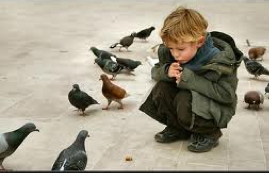Jake Eagle's Blog, page 17
July 19, 2013
A Conversation of Love
 Life is a conversation
Life is a conversationActually many conversations, but they all share one thing in common. Every conversation is either based in fear or love. This is true for the conversations we have with other people. And this is true for the conversations we have with ourselves—inside our own heads.
When we change our conversations from fear to love, we change the nature of our lives and relationships.
I have come to the frightening conclusion that there is only one way for us to evolve. It is in learning to be in a conversation of love. Why do I frighten myself with this conclusion? Because I perceive the vast majority of people who are attempting to evolve—to grow—are traveling down the wrong path.
What do I mean when I say they are traveling down the wrong path?
The operative word is “down.” Most people are unintentionally activating the lower parts of their brains, traveling down from their higher to their lower brain centers—taking the low road. Our lower brain centers have a short-term focus (very short). The focus is one of protection and survival right now.
When our lower brain regions are stimulated we become passive-aggressive, outright aggressive, or we abandon.
When we are passive-aggressive we allow others to treat us less than—less than kind and less than respectful. In doing this we hurt ourselves and use the hurt to victimize ourselves.
When we are outright aggressive we behave poorly/immaturely, often hurting others and ourselves. We then defend by justifying our behaviors and insisting on being right. We make others wrong. We punish others, even those that we love. We keep score. We build resentment. And we disappoint ourselves for being this way.
When we abandon, more often than not we abandon ourselves.
We then attempt to identify the problem and find a solution, often with the help of a therapist or some new methodology—
One Minute Mindfulness
Two Ways of Praying
Three Keys To Living a Successful Life
The Four Agreements
The Five Languages of Love
The Six Pillars of Self-Esteem
The Seven Habits of Highly Effective People
And on and on . . .
But our good intentions—and even the useful skills and tools contained in these great books—pave the road to hell. The hell of the hamster wheel. Trying and trying . . . inching forward . . . occasional breakthroughs, but still living with angst and tension and conflict . . . up and down . . . repeating the same old patterns—and not often enough bathing in the light of ease, intimacy and equanimity.
What to do? A new mindfulness practice. A new therapy. A new spiritual teacher.
All valuable and earnest attempts to create an easier, more joyful, healthier life . . . but still we find ourselves on the hamster wheel of self-improvement.
What’s the problem?
The problem is that every path is based on a conversation of fear. Not knowingly—absolutely not—but when we live in a world of right and wrong, believing that other people can hurt us, we are living in an emotional zero-sum universe. As soon as we frame the world in this way, we stimulate our own fears, and before the game begins, we lose.
What’s the solution?
Learning to live in a conversation of love.
A conversation of love is not a matter of being soft and gushy. It’s not a matter of clasping our hands in the prayer position and bowing when we meet other people on the path. It’s not handing someone a Kleenex when they cry. It’s not rescuing people from their pain.
A conversation of love is living without fear
A conversation of love is without blame, without victims, and without the fear that other people will hurt us. A conversation of love is self-respecting, personally revealing, and undefended.
In a conversation of love resistance is replaced with presence.
Wars of words are replaced with witnessing.
The past is past and the future holds hope.
This is possible
I just spent the last week living in a conversation of love. I witnessed twenty other people—mostly—living this way. This is what happens during a Reology Retreat. We learn to live in a conversation of love.
As we enter into this new conversation, we quiet our lower brain centers and stimulate our higher brain centers.
Fear dissipates.
Anxiety diminishes.
We come into the present, pausing, choosing, and aligning our actions with our higher intentions, while feeling more empathy and compassion for others because we no longer feel threatened by them.
We stop complaining about what we didn’t get, and instead, we simply ask for what we want. We treat our partner as our friend and when feeling insecure, instead of turning away, we turn toward one another.
This is possible
The key is learning a new way to speak. I’m not talking about using regular language to have a kinder conversation; I’m talking about a new kind of conversation. This conversation, based on a new way to use language, is the key to the kingdom of love.
Disclaimer: This is a reminder that everything we present on this website is based on how we—the authors—have come to understand our world and our relationships. We help ourselves immensely with this approach. We invite you to explore and decide for yourself what works for you.
The post A Conversation of Love appeared first on Reology.
July 16, 2013
Protected: Ocamora 2013 – scrapbook
This post is password protected. To view it please enter your password below:
Password:
The post Protected: Ocamora 2013 – scrapbook appeared first on Reology.
July 12, 2013
How to create Healthy Relationships
 There are many ingredients that go into creating healthy relationships:
There are many ingredients that go into creating healthy relationships:Respect
Adoration
Reciprocity
Shared values
Great chemistry
Compatible styles
But maybe nothing is more important than having healthy emotional boundaries. If so, then the question is, “what are healthy emotional boundaries?” and “how do we create them?”
Emotional Boundaries
Emotional boundaries are rules or limits that we create for ourselves. We create emotional boundaries when we specify what we consider to be appropriate ways for people to behave with us. And—what are the consequences if they behave in ways that we consider to be inappropriate?
When I was a very young boy, if I misbehaved my mother would tell me, “You can go play in the attic and come back down when you decide to be good.” She was letting me know what her emotional boundaries were—basically I had to be pleasant—and she let me know the consequence if I didn’t honor her boundaries—go to the attic.
The attic wasn’t such a bad place, it’s where I had my trains set up. I experienced great consistency from my mother and I felt empowered because I knew what I had to do in order to enjoy her companionship.
Interestingly, but not surprisingly, my wife, Hannah, has pretty much the same boundaries as my mother. She expects me to be pleasant if I want to enjoy her company. Of course she has other boundaries too—but most of them aren’t that different than the ones I grew up with. I’ve always been expected by others to behave well, but also encouraged to speak my mind.
Since I no longer have a train set in the attic, I have more motivation than ever to be “good.”
Emotional boundaries live on a spectrum from rigid to wishy-washy. Neither extreme works very well. If we have rigid emotional boundaries we limit our ability to connect with people. If we have wishy-washy emotional boundaries—anything goes—we overwhelm ourselves and never find a safe haven. In both extremes we limit the possibility for intimacy.
I tend to have fairly strict emotional boundaries. So I need to continuously reevaluate if I’m being too rigid. Because my emotional boundaries are rather strict, two things happen. First, the relationships I do have are healthy relationships—deep, sustainable, and profoundly rewarding. Second, I’ve chosen to sever other relationships—even with family members—because I was unwilling to tolerate behavior that I experienced as disrespectful.
As a result, I comfort myself greatly with the relationships I do have and I disappoint myself to have lost connection with some of other people, including family members.
If you’re trying to establish emotional boundaries, here are some questions that may be helpful. I’ve provided a couple sample answers to each question:
What do you need from the other person so that you feel safe?
I need for you not to raise your voice or swear, even when you’re upset, just talk to me.
If you need to walk away from me because you’re upset, please let me when you’ll be back.
What do you need from the other person so that you feel respected?
When I express a concern or a need that I have, please don’t make that conversation be about you.
Please don’t tell me my opinions are wrong or suggest that I’m not being truthful.
What do you need from the other person so that you feel valued?
I want you to really hug me when we hug, and not have it feel like a casual, autopilot kind of thing.
I want you to ask me for help before you become overwhelmed.
What makes it easier for you to hear criticism about you?
If you’re upset with me, please don’t bring it up after 10:00 o’clock in the evening.
When you’re critical of me, I still want you to treat me like I’m your friend.
Answering these questions is a way for you to start defining your emotional boundaries. Notice that these are fundamental needs that we all have—to feel safe, respected and valued. Figure out how you satisfy these needs—what do you require—and then let the people you are closest to know.
The reason I suggest that you tell people who you are close to what will make it easier for you to hear their criticisms of you is because inevitably they will have criticisms, even though they love you. So, how can they express their concerns is a way that will make you more likely to hear them?
Emotional boundaries evolve over time. The longer we are with someone—a partner—the more trust we establish, hopefully. As this occurs, our emotional boundaries may become more flexible in certain areas. But, there are some things that are simply non-negotiable for people. It really helps to be clear about what those are so that you never mistakenly cross those lines.
And, what if someone does cross your line? What are the consequences. This subject deserves it’s own article, which I will write in the weeks to come. But think about the consequences—because without them, boundaries don’t mean much.
If you want to open yourself to a fascinating exploration of emotional boundaries, I suggest you watch the 2012 movie: Sessions. I experience this remarkable movie as a beautiful, yet unusual, example of clear emotional boundaries.
The post How to create Healthy Relationships appeared first on Reology.
July 5, 2013
Patience
 Patience is not passive; on the contrary, it is active; it is concentrated strength.
Patience is not passive; on the contrary, it is active; it is concentrated strength.Edward G. Bulwer-Lytton
How many times a day do you check your email? I don’t even want to ask myself that question.
I don’t even want to know because I’m pretty sure I have a little bit of an addiction there or at least resistance to the patience it would take to wait until the end of the day to receive any mail I didn’t receive that morning.
I believe this is a troubling phenomenon in our modern world and that we may be losing our affinity for just “being” instead of “doing” all the time.
There is power to be had in just being a patient observer. There is an effort that’s needed to remember to slow down and be present for whatever is happening now, especially when we have a long list of things that we need to do. How often do we take even small moments of time to stop and observe what is going on around us? Often we are simply lost in our thoughts or on autopilot.
CHOOSING PATIENCE
Standing in a long – long line at the grocery store on the 3rd of July, a day before our big American holiday, I’m feeling impatient. I have too much to do to be waiting in line. I realize I could victimize myself with having to wait, but instead I make a choice. I decide to become acutely aware of what is happening right now and entertain myself with what could be perceived as a fairly boring experience.
First I take in the man in front of me, who saw me heading for the line and rushed to get in line ahead of me. My thought at the time was: “Are there are no gentlemen left in the world?”
I begin to notice his restlessness and discomfort standing there and think perhaps he is late for something or maybe he feels trapped while standing in line, or I wonder if his wife is at home suffering from a migraine and she’s needing the medication he holds in his hands. I don’t know—but I begin to feel compassion for this stranger and grateful for my momentary choice to practice patience.
The woman checking out is arguing with the young cashier over the price of an item, further delaying the long line of shoppers. A woman in line behind her throws her items down on the counter in exasperation and yells “Forget it! I’m outta here!”
Quietness of observing
Then I am left with the quietness of observing.
The little kid in his mom’s basket behind me is just watching. He does not have to make the choice of being patient. He has not yet lost his wonder of the world. Every moment is full of new and interesting things and, in this case, some curious human behaviors. He is in a state of “being” here for whatever is going on and whatever happens next. For adults, it takes effort to even remember to pay this kind of attention.
WHAT DID PEOPLE DO BEFORE EMAIL?
We recently watched a classic western movie. Set in 1876 in a tiny Texas border town (Lonesome Dove) with one general store, one saloon/hotel, and one lady of the evening that everyone shared. During the movie I thought about what life a hundred and fifty years ago would have been like, especially after the chores and the evening meal were over. What would you do with yourself back then before an early bedtime?
There was no email to check (and a letter took weeks to arrive at it’s destination), no television to watch, no radio (radio wasn’t even invented until 1895), and very few, if any, books to read—no library.
If alone, there was the porch and the sun setting and the rocking chair. Did people spend a lot more time just “being” in the evenings instead of doing? Did they watch a whole sunset, feel the breeze, smell the roses, notice fireflies?
The world seems to have sped up—we can do more and so we do more and faster. Patience may be becoming obsolete. I hope not. I am grateful when I remember to slow down and choose to notice what is around me, that I’m awake and feeling very alive, and that there is a lot to pay attention to—even when standing in line.
Reology Retreats have been my greatest teacher in learning how to slow down, speak consciously, have more patience, and to appreciate “being” at least as much as “doing.”
June 28, 2013
How To Let Go
 What do you need to let go of?
What do you need to let go of?I work with a lot of couples in my therapy practice. They come to therapy because they are discontented—and brave. That’s why I enjoy this work. These couples that come to me are motivated to make changes in the ways they relate to one-another. And they are brave enough to say, “What we’re doing isn’t good enough—we want something better.”
What’s the difference between couples that are successful in their partnerships and those that fail?
One secret is the willingness to let go.
In this article I’ll explore some of the things we need to be willing to let go of.
Letting go of past grievances
We have to be willing to let go the past, from petty grievances to serious mistakes we (or our partner) made. We can’t be present if we hold onto the past, so once a mistake occurs we need to decide, “Am I going to let this go and be fully in this relationship?” because if we can’t let go we shouldn’t stay together.
Letting go of the need to be right
We must let go of our need to be right, but while still respecting our need to fully express ourselves. The way people ordinarily talk to one another makes this hard because we say things as if we know what “the truth” is. Of course, we don’t. We only know what’s true for us. If we learn to use ReSpeak, it’s much easier to express ourselves without the other person feeling like we think our perspective is the only truth and that we’re telling them about them.
Letting go of your defenses
We don’t have to let go of our defenses to be with our partner, but if we want to develop deep intimacy, then we do need to let go of—or let down—our defenses and the ways we protect ourselves from being hurt. The very notion that “my partner will hurt me” greatly limits our potential as a couple. Within the Reology worldview there is no fear that my partner will hurt me, because I don’t hold my partner responsible for how I feel. (I know this is a stretch for some of you—this is a completely different paradigm—and if you want to really understand this way of being in relationship, I encourage you to come to one of our retreats.)
Letting go of your partner
So, there are many things we need to let go of—in my opinion—to create a successful romantic partnership. And if you’re in the early stages of your relationship and it’s not going well, the “thing” you may need to let go of is the other person. So many people have a hard time with this. They tell me that they’re afraid of letting go of what they have, but I think that in many cases they’re afraid of letting go of the fantasy of what they believe they could have. Letting go of the wrong partner doesn’t mean we let go of finding the right partner—it moves us closer.
I just worked with a woman who clearly needed to let go of her partner. And she did so. Here’s how she described the experience.
For the first time since last week, since my appointment with you, I saw John (fictitious name). We took a walk and I told him I had let go of the idea of he and I as a couple, that I had let go of trying to make something happen between us. He was rattled. He smiled a lot but it was kind of vacant. He did this thing he does when he’s trying to take a deep breath but can’t. He told me that he’d been thinking of me every ten minutes for the last couple of weeks, that he’d been missing me and that he’d become accustomed to having me in his life and was orienting around making choices that included me in the future.
To me, he’s talking about the fantasy, not the reality of how he actually behaves. He’s saying, “I have a great fantasy about what we could be,” but that’s not what he’s creating.
He also said that part of him was really happy for me and proud of me that I had stepped into this place with myself. He said he’d been wanting to experience me in this place—of me being fully in myself and in my power—and now that I’m here, I’m dumping him. He said he has a lot of sadness. I kept clear in my choice and also tried to stay light. I stayed light because it kept me with myself and not reaching out to him for care in my own sadness and vulnerability. I avoided taking care of him. I didn’t apologize for my clarity.
This is the key to me, she remained light, she didn’t go into her sadness and vulnerability, which would have been an invitation for him to attend to her. It’s not appropriate to ask the people we break up with to attend to us, but so often I see people do this.
I reminded him of how difficult it was to connect with each other and how it was clear that I couldn’t meet him and that he was very clear that he wasn’t willing to share himself with me, nor could he meet me. I honestly thought he’d be relieved. I thought he was in a similar place of not being met and of it being awful.
There was a part of me at one point that wanted to take it all back and try again. There was a part of me that wanted to chase him into his house instead of drive away. But I didn’t because I remembered how awful I feel around him, disconnected and disjointed and diminished. I imagined how the rest of the evening would have gone. Me feeling unconnected to him and to myself, screaming inside and trying to hide it, looking for any signal or hint that I was okay with him so I could be okay with myself. The energy between us had become so jagged, pointy and heavy.
This is the power of honesty. And also of staying aware of those bodily sensations that tell us, “this isn’t right.”
I’m sure I could’ve expressed myself better, looking back. I could’ve done it so many different ways. But I held to my truth when I’ve slipped out so easily in the past. I didn’t take anything back. I didn’t go chasing after. I tried my hardest not to confuse the situation. No doubt I probably did a bit because I kept laughing—I didn’t intend to. I was just happy, felt relieved and joyful and I couldn’t hide it—but I tried to do the least amount possible of confusing the situation. I didn’t say let’s be friends and hang out next week or I’ll call you. Or any of that. I kept taking care of myself instead of him. I tried to be neutral and light and compassionate for myself, for once, and also for him as long as it didn’t pull me out of myself.
Compassion doesn’t mean care-taking. She is so clear about the difference.
So I’m done with John. No doubt there will be waves of all kinds of emotions but my intention is to hold steady in my truth again and again and again. No backsliding this time. No sliding back into a world of hurt and confusion and constant miscommunication and always trying to please, only to be ridiculed and punished for such behavior. I need to continue to sit with it and thoroughly be with it so I don’t numb out or freeze over. So I don’t go walking into the same trap I’ve successfully created for myself over and over again.
I’m mourning for what didn’t happen, for what wasn’t possible with this person with who I so wanted it to be possible with—deep, meaningful connection, lasting love, sharing lives. I’m not mourning for the loss of the situation or of him, I’m deeply relieved that I no longer will choose to put myself into such a turbulent reality.
I view this as a story of triumph, a woman willing to let go of something “not good enough”—for her—so that she can pursue what she wants.
The post How To Let Go appeared first on Reology.
June 21, 2013
Being Human
 Feel stuck?
Feel stuck?How do you un-stick yourself?
By being human.
I recently had a patient come in, a lovely, fairly successful, quite confident teacher in the field of personal growth. She was feeling stuck in her life. She could not motivate herself to do the things she needed to do to promote her work, something she was otherwise passionate about.
She was holding herself captive by her own “shoulds”. She should know how to un-stick herself. She should be empowering herself in the same way she teaches others to empower themselves. She should be walking her talk. She should not have to promote herself, people should be knocking down her door to sign up for her workshops, and she certainly did not want to be seen as less than successful.
She was sort of comfortable sharing this with me privately, but certainly would not put herself out there in a group setting (like the ones she usually facilitated) where she might reveal herself as imperfect. She did not want to appear to be less than wildly successful and was not comfortable with just being human.
CAN WE DARE TO BE SEEN AS HUMAN AND IMPERFECT?
I assume we all want to be seen as being on top of our game. And when we are not, that can be the hardest time of all to do what we need to do to move forward, which is to be vulnerable. But that first step forward is the one that will get us going in the right direction—helping us un-stick ourselves from our inertia. Admitting we are human, less than perfect, can often be the starting point. And this can be very freeing.
YEAH! I DON’T HAVE TO BE PERFECT!
One of my most potent growth experiences was in a retreat we did in Hawaii on the island of Molokai many years ago. I walked out on the Lanai (Hawaiian veranda) to find a woman tucked up under my husband’s arm on the sofa outside. She was looking for attention. She had just done some deep work. He was just being considerate. But I stirred up my old jealousy gene—the one I preferred to hide.
During the next session at our retreat, I reported my experience, my jealousy and my need to hide this part of me. Once my demon was out, I felt like I’d had an exorcism.
Prior to this, I thought teachers are not supposed to be quite so revealing, just hold out a positive example. But from that time on, I never valued that kind of withholding again. I valued being human. I perceived people appreciated me more that way anyway.
What I valued most was the relief I felt from not having to hide any more. From that point on I was much more honest to myself and to others. I did not have to appear perfect, which, in turn, helped others be more self-accepting.
FREE AT LAST!
Sharing our humanness, our vulnerability, our imperfections with a group of people who are also working to grow themselves is often the best remedy for un-sticking ourselves, getting ourselves moving forward. It is where I often most inspire myself and get my creative juices flowing.
This is true no matter what we do or where we are in life. The experience of letting ourselves be vulnerable with a like minded group of also “human” people, can provide a freedom unlike any other.
And by the way, not that this was my goal at the time, but I have never experienced jealousy to be the problem it used to be, not since that retreat. If you would like a taste of freedom, freedom to be yourself, and love yourself better for doing so, we have two places left for our upcoming retreat.
Call me soon if you want to get yourself moving forward. Revealing is not a requirement in this work, but the retreat offers that delightful opportunity.
The post Being Human appeared first on Reology.
June 14, 2013
The Path of Self-Improvement
 What’s the right path for you? Where are you going—in terms of your self-improvement and personal growth? And how are you going to get there? Is there only one way, or many?
What’s the right path for you? Where are you going—in terms of your self-improvement and personal growth? And how are you going to get there? Is there only one way, or many?
This is kind of how I think about psychotherapy, as a chance for each of us to chart our own course. To do this we need to take into consideration where we’ve been, what resources we have, what additional resources we need, where we want to go, and to what degree can we trust ourselves. Then the question is, “What’s the best way for each of us to get where we want to go?”
I was recently helping a client chart his course and he accused me of being “discordant.” When I asked what he meant he said, “You espouse ideas about how pretty much everything is subjective, everyone has to figure things out for themselves, but then you go on and tell me the best way to live my life as if you know what’s best for me.”
Guilty as charged
Basically my client’s criticism is valid. I am quite emphatic about how I think we should live our lives if we want to create certain results. And, I don’t often enough remind people that I’m always talking about my view of the world and what works for me—as well as so many of the people I’ve worked with. I really should preface more of my sentences with statements like, “I have helped myself by . . . ” Or, “If you want your romantic relationship to be easy, Hannah and I have learned that what works for us is . . . ”
So, let me set the record straight. I don’t think that there is one way or one path that is right for everyone. I think that part of growing up and taking responsibility for our lives is deciding for ourselves what practices to pursue, what workshops to attend, and what teachers to study. We each need to lay the bricks that create our paths.
I have another client who has recently made a remarkable and positive transition in his life. When I asked him what was most helpful, he said, “All the different pieces have come together for me—therapy, homeopathy, my Buddhist practice, my 5-rhythms movement practice, and the Reology retreats I’ve attended with you guys.”
And what I realized as he rattled off these different methods is that each one built upon the others. The similarities in his different practices reinforced what he was learning, while the differences in the practices required him to explore himself more deeply and find his own resolution. As a result, he has charted a course that works for him.
This is what I want for all of us; to chart our own courses—that lead us toward health—emotional, mental, physical and spiritual.
One caveat
I want to say that one of my most deeply held beliefs is that no matter what path we choose—learning to use ReSpeak is essential. Why? Because whatever path you choose, if you talk to yourself and other people using ordinary language, you will speak (at times) as if you are a victim, because that’s the structure of ordinary language.
When we say things like:
She makes me so angry.
They ruined my day.
He makes me feel unsafe.
She makes me feel disrespected.
We are speaking as victims. We are talking as if other people are responsible for how we feel. Reology proposes that we are each responsible for how we feel. Other people don’t make us angry, we make ourselves angry. Other people don’t ruin our day, we do this to ourselves. People don’t really make us feel unsafe (except in extreme situations like a robbery or a physical assault), we make ourselves feel unsafe. People don’t disrespect us, we disrespect ourselves.
People are going about their lives doing what they do. I won’t go as far as to say that they are doing the best they can (here’s a blog I wrote about that subject). Instead, I will say that—from my perspective—their behaviors are a reflection of them, not me. The further I travel on my path, the less I personalize other people’s behaviors.
The post The Path of Self-Improvement appeared first on Reology.
June 11, 2013
ReRight Your Life Book Tour

“I promise you this book will answer your questions—in a substantive way—about how to live a more meaningful life, how to create healthy and intimate relationships, and how to reduce your anxiety.”
Jake Eagle
Author and Co-Founder of Reology.org
Join Us for a Virtual Book Tour
Jake Eagle will visit the following popular blogs for a virtual book tour from June 24-30, 2013. At each site, bloggers will review ReRight Your Life and share an exclusive interview with author Jake Eagle. Visitors on the tour can expect to gain more insight into the book and the various topics covered, as well as learn more about Jake and his own path to “re-righting” his life. If you are serious about change, this is a self help book that creates lasting change.
Tour Dates:
Monday, June 24: Inside Book Buzz
Tuesday, June 25: CoupleDumb
Wednesday, June 26: The Reality & Truth by Jason Jean
Thursday, June 27: Olivia Linden Write or Die!
Friday, June 28: The Literary World
Saturday, June 29: Flash Reviewer
Sunday, June 30: The Book Faery Reviews
ReRight Your Life: An Introduction to Reology introduces readers to a new way to create happiness and healthier relationships. This is an unusual self help book in that it’s easy to read while being substantive.
Jake Eagle, a licensed psychotherapist, tells a moving personal story as a guide for learning, which unfolds through a riveting dialogue between Eagle and his terminally-ill brother. In ReRight Your Life, Eagle explores the meaning of life, behavior patterns that hold people back, the process of individuating, ways to discover personal values, and a new way to speak to ourselves and others. These concepts provide a solid introduction to Reology, the art and science of learning how to be happy.
The post ReRight Your Life Book Tour appeared first on Reology.
June 7, 2013
Healing Ourselves
 I think that most of us are chasing ghosts.
I think that most of us are chasing ghosts.The ghosts are our unfulfilled needs from childhood.
Not getting the love we wanted.
The validation we wanted.
Not feeling valued.
Not feeling safe.
So, later in life we pursue ways of healing our old wounds, and many forms of therapy encourage us in this direction. These therapies suggest that healing our old wounds is possible if we are sufficiently acknowledged and nurtured by others.
I don’t really believe that. To completely heal our earliest wounds seems unrealistic to me. Instead, I think we can partially heal ourselves while also accepting that certain wounds and deprivations are part of our story. And how we tell our story—how we make sense of our disappointments in life—may shape us as much or more than the original events shaped us.
Do you think of yourself as wounded?
I concern myself that when therapy focuses too much on healing old wounds it may prolong our suffering in two ways. First, we think of ourselves as wounded. Second, we spend a great deal of time going around looking for solutions.
In addition to psychotherapy, the most common solution for healing ourselves is to find someone else to do it. This can result in us transferring the power and responsibility to another person to heal us. Usually we look to romantic partners to help heal our earliest deprivations. And, regrettably, we often look for people who remind us of the person who originally inflicted the wound.
When the wound was originally inflicted, we were children; we were victims—victims of insufficient love, attention, validation, or safety. If as adults we go out and look for someone to fill these holes we have in us, we may reenact our role as the child, the victim. But we are no longer a child and no longer a victim, so we may confuse ourselves.
And, when we look for someone to play the role of our wrongdoer, what kind of person is likely to sign up for that? It’s usually someone who isn’t good at giving love, attention, validation or making us feel safe. That’s why we pick them—they remind us of the original circumstances in which we first felt deprived.
The people we gravitate toward may not be the people who can heal us.
Can anyone heal us? From a Reology perspective we do not say that the other person heals us, we say that we heal ourselves with the other person. It is up to us to be actively engaged in directing our healing process. We are not relying on someone else to make us okay. But to do this—to heal ourselves with the help of another person—we must wisely pick the people with whom we choose to relate.
We must pick someone who knows well how to love, validate, attend to, and create safety. People who can do this are reasonably healthy and so they’re looking for someone else who is reasonably healthy. Having wounds doesn’t prevent us from attracting a healthy partner; it’s all a matter of how we present ourselves. If we present ourselves as a victim, we’re less likely to attract someone who is healthy. If we present ourselves as taking responsibility for our growth and development, we’re more likely to attract a healthy partner.
What does it sound like to take responsibility for our growth and development—for our wounds?
I frustrate myself terribly when I find out that you haven’t been completely honest with me. I have a hard time staying connected to people if I don’t think they’re honest. This is because people weren’t honest with me when I was a child, so I’m very sensitive about this. I’m not making excuses for why I get so reactive when I think you aren’t being completely honest, I’m just letting you know that this is important to me. Because of my history, I try to avoid being around people who aren’t direct and fully disclosing. So now you have this information and I hope you respect my need for honesty.
What does it sound like to transfer responsibility to the other person?
You make me so angry when you aren’t honest with me. You push me away when you don’t include me. This is what happened to me when I was a child, so when you don’t tell me the truth you’re pushing all my old buttons, which is why I overreact at times. You never listen to me when I get upset. No one ever listened to me when I was young. If you aren’t honest with me this issue will never go away.
When we speak with an adult voice—expressing childhood wounds—we heal ourselves. We invite other people to see us, to understand us, but not to take responsibility for us.
To summarize, I believe that we can only partially heal our old wounds. Psychotherapy is one way to do so, but I am cautious about therapies that continually revisit the past without placing at least equal emphasis on the present.
Romantic relationships are another means of healing ourselves, but my caution here has to do with our choice of partners. We can help ourselves if we choose the right partner. We can hinder ourselves if we choose the wrong partner, which results from an unconscious attraction to someone who is uncannily similar to the people who hurt or disappointed us when we were children.
In a future article I will describe two different strategies for healing ourselves from early life disappointments.
The post Healing Ourselves appeared first on Reology.
May 30, 2013
What’s Good Enough?
 Do People Really Do The Best They Can?
Do People Really Do The Best They Can?Have you heard the expression, “People do the best they can”? Do you believe that? Really? You believe that a father who abused his daughter did the best he could? You believe that a wife who cheated on her husband did the best she could? You believe that a friend who holds back their frustration with you, and then later punishes you without telling you why, is doing the best s/he can? You believe that someone who compromises their values for expediency is doing the best that they can? I don’t believe any of these people are doing the best they can.
The suggestion that “people do the best they can given who they are at any given time,” is intended to offer us some kind of relief. And to promote compassion. Dr. Fern Kazlow, Ed.D, a licensed clinical psychotherapist, explains this commonly held belief.
“People can only do their best, whether or not we think their best is misguided or wrong. When we decide others could have done better—we get stuck. Years of clinical practice have shown me that holding the attitude that everyone does the best they can makes life work better. Is it easy to adopt this attitude? No! It involves breaking lifelong habits and long-standing beliefs about change, motivation and right versus wrong. However, with determination, consistent practice and effective tools, we can change our attitude and our lives.”
Dr. Kazlow goes on to explain that it helps when we apply this same idea to ourselves. The idea being that what we have done is good enough. “When trying to change our own thinking, the process can be even trickier. When you think you could have done better, it weakens you.”
I’m sorry, but I don’t buy this popular myth that we always do the best we can. I do however agree with Helen Keller, who said,

“When we do the best that we can, we never know what miracle is wrought in our life, or in the life of another.”
Helen Keller is advocating that we do the best we can and not letting us off the hook when we don’t.
Why do so many people want to believe that what they did—or what other people did—is good enough when they are clearly unhappy with the results? When I treat my wife poorly (a rare event), she says to me, “That’s not good enough!” She doesn’t excuse my behavior, nor does she buy my excuses. She says, “I don’t care, I expect more from you.” What’s the result of this kind of interaction? I step up. I improve myself. I grow. I work hard to live up to her expectations. And when I do, I feel good about myself. And it’s a two-way street, although she rarely behaves poorly.
I just worked with a client who was telling me that he had recently gotten into a conflict with his wife because he handled a situation in a pretty sloppy way. He went on to justify his actions by saying, “I did the best I could under the circumstances. I wasn’t sure what was the right thing to do.” Somewhat incredulously I asked him, “Really? You really didn’t know what was the right thing to do?”
Very quickly he said, “No, I did.” Of course he did. So why did he start off saying, “I did the best I could”? He used it as an excuse to hide. He was hiding that he knew what was right as a way to justify doing what was wrong. How do we help this man by going along with his excuse? I don’t think we do.
Dr. Kazlow disagrees with me. She thinks that we weaken ourselves when we acknowledge that what we have done isn’t good enough. I think we call forth the best in ourselves by holding high—yet realistic—expectations of ourselves.
Maybe this is the crucial difference. I can be critical of myself, or other people, when our behaviors aren’t good enough, but I do this in a loving context. I want myself and the other people to do better. I believe we can do better. One way to show my love is to hold a high expectation of you and when you behave in ways that aren’t good enough—according to our agreements—respectfully tell you that I expect more from you.
To hear more about this subject, listen to Jake Eagle being interviewed by Mike Bundrant of PsychCentral
The post What’s Good Enough? appeared first on Reology.



